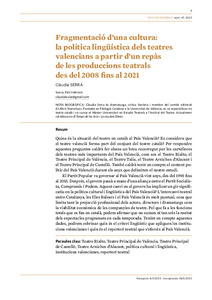Fragmentació d’una cultura: la política lingüística dels teatres valencians a partir d’un repàs de les produccions teatrals des del 2008 fins al 2021
Metadata
Show full item record
Estudis escènics: quaderns de l'Institut del Teatre. 2022, Núm. 47
Document typeArticle
Abstract
<p>Quina és la situació del teatre en català al País Valencià? Es considera que el teatre valencià forma part del conjunt del teatre català? Per respondre aquestes preguntes caldrà fer abans un breu recorregut per les cartelleres dels teatres més importants del País Valencià, com ara el Teatre Rialto, el Teatre Principal de València, el Teatre Talia, el Teatre Arniches d’Alacant i el Teatre Principal de Castelló. També caldrà tenir en compte el context polític del País Valencià durant els anys que delimiten el nostre estudi. El Partit Popular va governar al País Valencià vint anys, des del 1995 fins al 2015. Després, el govern passà a mans d’una aliança entre el Partit Socialista, Compromís i Podem. Aquest canvi en el govern ha implicat un gir significatiu en la política cultural i lingüística del País Valencià? L’intercanvi teatral entre Catalunya, les Illes Balears i el País Valencià és molt puntual, cosa que limita tant la projecció professional dels actors, directors i dramaturgs com la viabilitat econòmica de les companyies de teatre. Pel que fa a les funcions totals que es fan en català, podem afirmar que no sumen ni tan sols la meitat<br />dels espectacles programats en cada temporada. Tenint en compte aquestes dades, podrem esbrinar quin és el criteri lingüístic que apliquen les institucions valencianes i quin és el repertori teatral que s’ofereix al País Valencià.</p> <p>What is the state of theatre in the Autonomous Community of Valencia? Is Valencian theatre considered part of Catalan theatre as a whole? To answer these questions, we must first take a short tour of the listings of the most important theatres in the Autonomous Community of Valencia, such as the Teatre Rialto, the Teatre Principal de València, the Teatre Talia, the Teatre Arniches in Alicante and the Teatre Principal de Castelló. The political context of the Autonomous Community of Valencia during the years covered by this study must also be considered. The People’s Party (PP) governed the Autonomous Community of Valencia for twenty years, from 1995 to 2015. Then the government passed to an alliance between the Socialist Party, Compromís, and Podem. Has this change of government meant a significant shift in the cultural and linguistic policy of the Autonomous Community of Valencia? The theatrical exchange between Catalonia, the Balearic Islands and the Autonomous Community of<br />Valencia is very specific, which limits both the professional scope of actors, directors and playwrights and the economic viability of theatre companies. In terms of total performances in Catalan, we can say that they do not account for even half of the shows programmed in each season. By examining this data, we will be able to identify the linguistic criterion applied by the Valencian institutions and the theatrical repertoire offered in the Autonomous Community of Valencia.</p>
Access conditionsOpen Access
ISSN2385-362X
,
0212-3819
Collections
- 2022: Núm.: 47 [18]


